Harry Spindel Memorial Lectureship
Established in 1977 by the gift of Rosalyne Spindel Bernstein, Honorary 1997, and Sumner Thurman Bernstein in memory of her father, Harry Spindel, as a lasting testimony to his lifelong devotion to Jewish Learning, this fund is used to support annual lectures in Judaic studies or contemporary Jewish affairs. The fund has celebrated Jewish culture and identity through lectures, music, photography, and film.
Current lecture co-chairs: Jennifer Taback and Jill Pearlman
Tuesday, October 24, 2023
Walkers in the City: Jewish Street Photographers of Midcentury New York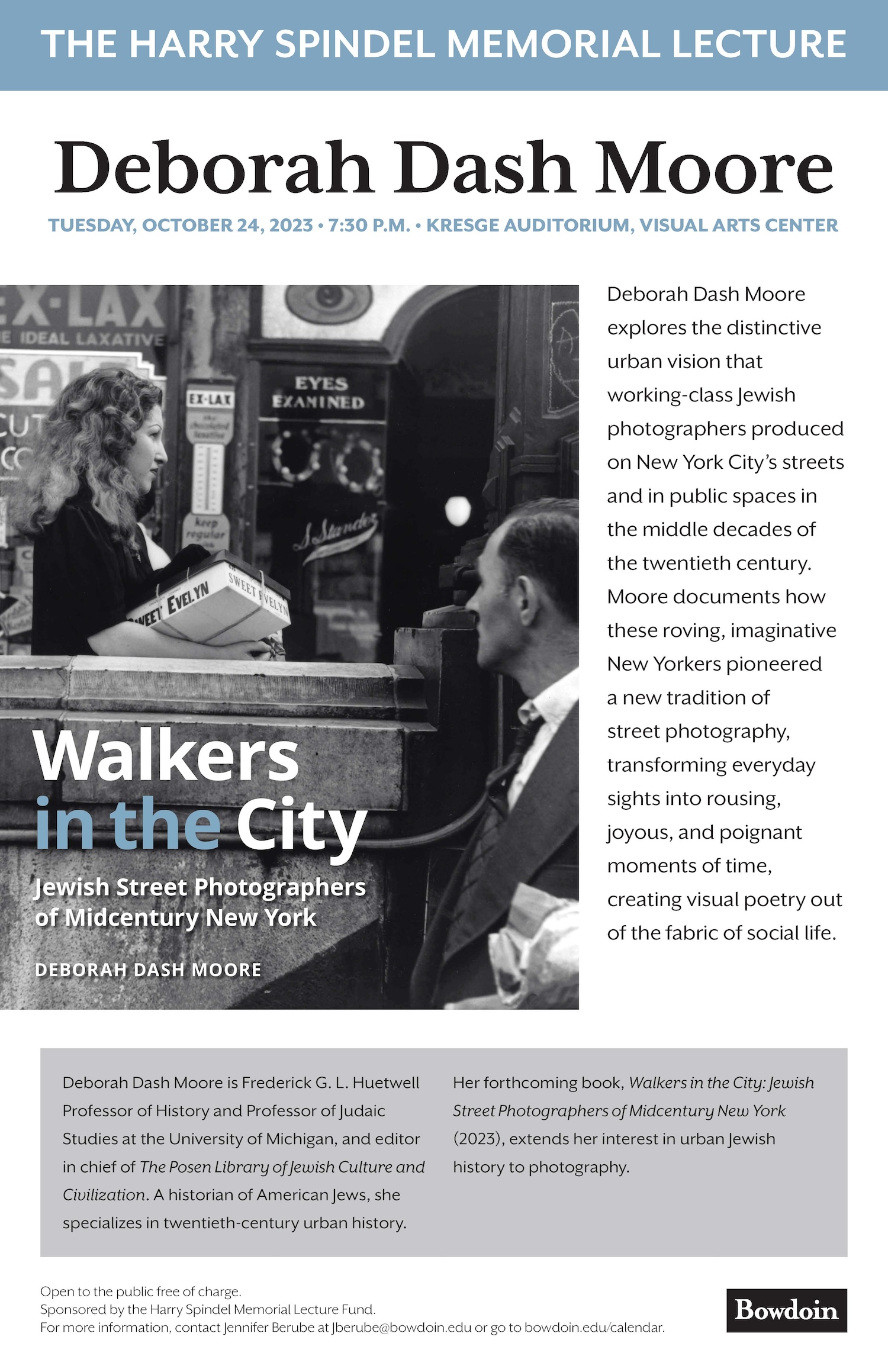 Deborah Dash Moore, Frederick G. L. Huetwell Professor of History and Professor of Judaic Studies at the University of Michigan
Deborah Dash Moore, Frederick G. L. Huetwell Professor of History and Professor of Judaic Studies at the University of Michigan
Walkers in the City showcases the distinctive urban vision that working-class Jewish photographers produced on New York City’s streets and in public spaces in the middle decades of the twentieth century. Drawing on their experiences, Deborah Dash Moore offers a perspective on New York as seen through their eyes—a cityscape of working-class people. With their cameras, these photographers pictured Gotham’s abrasive social milieu and its evanescent textures and light, creating an archive of vernacular images of city life and a distinctive tradition of street photography that would be widely imitated. Walkers in the City documents how these roving, imaginative New Yorkers, entranced by the medium of photography, transformed everyday sights into rousing, joyous, and poignant moments of time, creating visual poetry out of the fabric of social life.
Deborah Dash Moore is Frederick G. L. Huetwell Professor of History and Professor of Judaic Studies at the University of Michigan. A historian of American Jews, she specializes in twentieth-century urban history. Her forthcoming book, Walkers in the City: Jewish Street Photographers of Midcentury New York (2023), extends her interest in urban Jewish history to photography. Currently she serves as editor in chief of The Posen Library of Jewish Culture and Civilization, a ten-volume anthology of original sources translated into English from the biblical period to 2005, selected by leading scholars.
Tuesday, March 7, 2023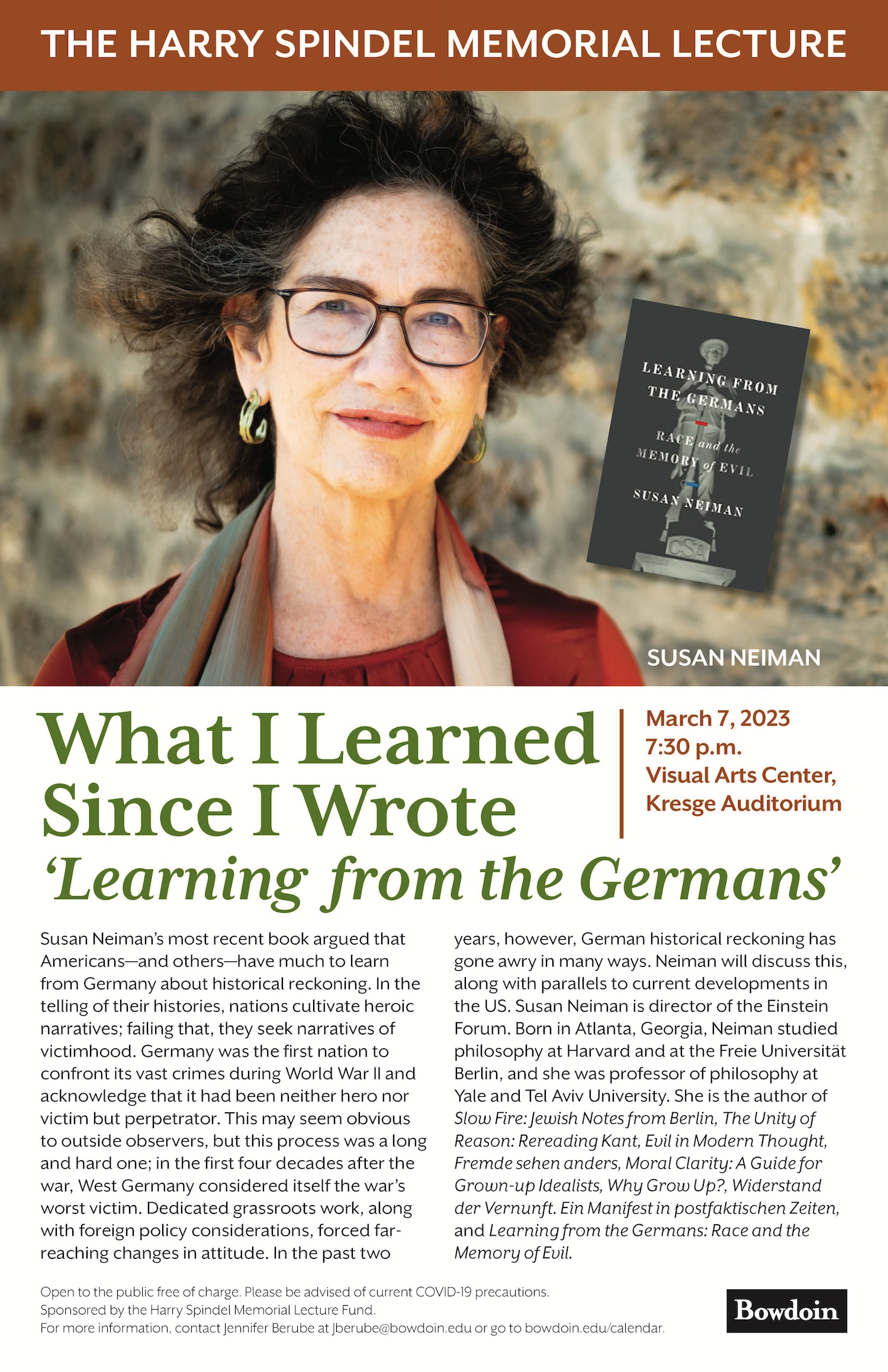 What I Learned Since I Wrote 'Learning From the Germans'
What I Learned Since I Wrote 'Learning From the Germans'
Susan Neiman's, Director of the Einstein Forum
Susan Neiman's most recent book argued that Americans - and other peoples - have much to learn from Germany about historical reckoning. Germany was the first nation to confront its vast crimes during World War II, but this process was a long and hard one; dedicated grassroots work along with foreign policy considerations forced far-reaching changes in attitude. In the past two years, however, German historical reckoning has gone awry in many ways. Ms. Neiman will discuss this, along with parallels to current developments in the U.S.
Susan Neiman is Director of the Einstein Forum. Born in Atlanta, Georgia, Neiman studied philosophy at Harvard and the Freie Universität Berlin, and was professor of philosophy at Yale and Tel Aviv University. She is the author of eight books, including Slow Fire: Jewish Notes from Berlin, The Unity of Reason: Rereading Kant, Evil in Modern Thought, Moral Clarity: A Guide for Grown-up Idealists, Why Grow Up?, and Learning from the Germans: Race and the Memory of Evil.
Thursday, February 11, 2021
"Translating the Bible"
Robert Alter, Professor of Hebrew and Comparative Literature at the University of California at Berkeley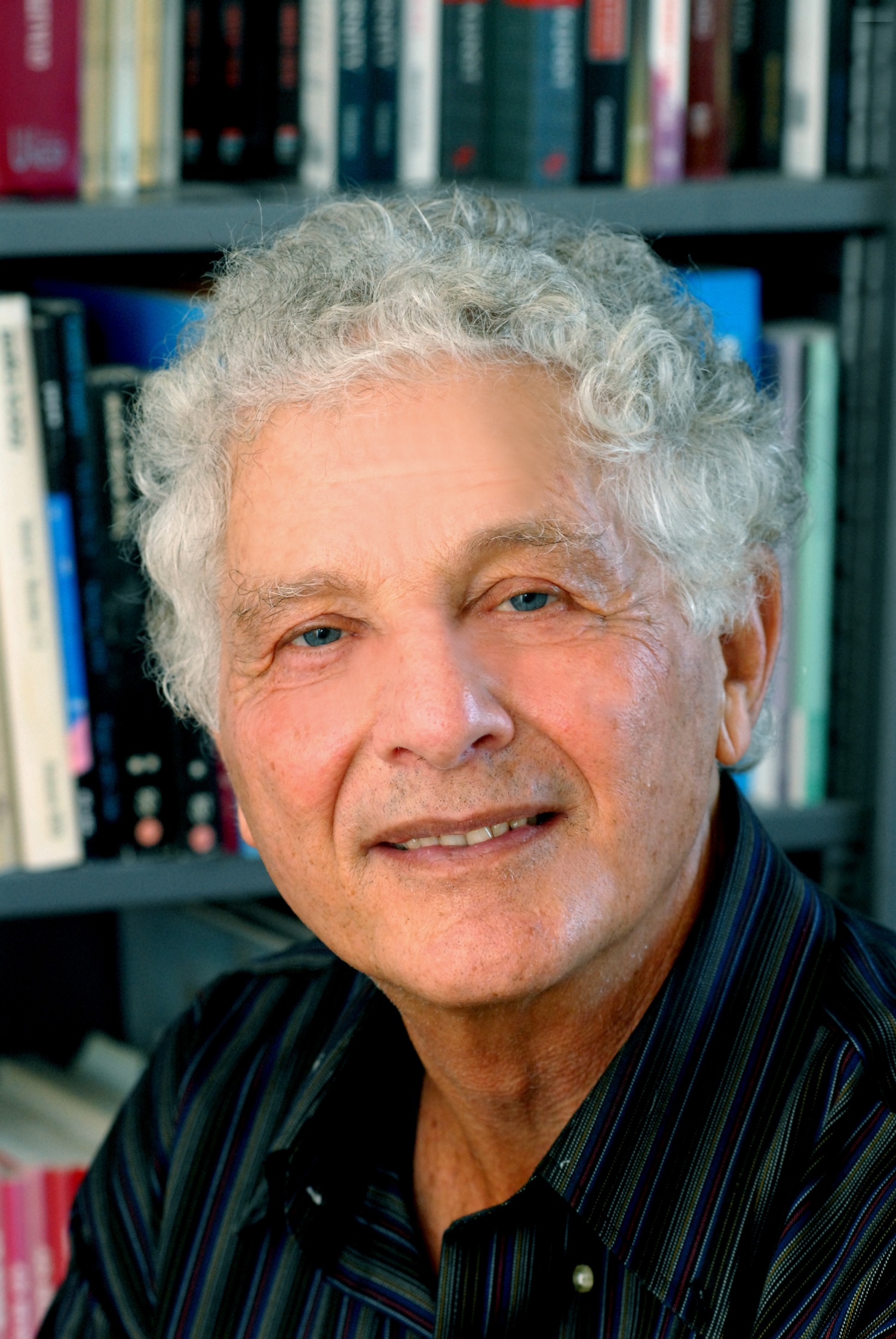
The Hebrew Bible incorporates a great deal of artfully fashioned narrative prose and finely articulated poetry. These are essential to the vision of God, creation, and humanity conveyed in the texts, and so a translation should strive to suggest in English something of the stylistic power of the Hebrew--its rhythms, its deployment of expressive syntax, the fine precision of its word choices, the eloquence of its diction. The challenge to the translator is that there are such large structural and semantic differences between biblical Hebrew and modern English, and strategies have to be worked out to bridge that distance.
Robert Alter is Class of 1937 Professor of Hebrew and Comparative Literature at the University of California at Berkeley, where he has taught since 1967. Professor Alter has written widely on the European novel from the eighteenth century to the present, on contemporary American fiction, and on modern Hebrew literature. He has also written extensively on literary aspects of the Bible. His twenty-two published books include two prize-winning volumes on biblical narrative and poetry and award-winning translations of Genesis and of the Five Books of Moses.
Thursday, September 19, 2019
Jews and Borders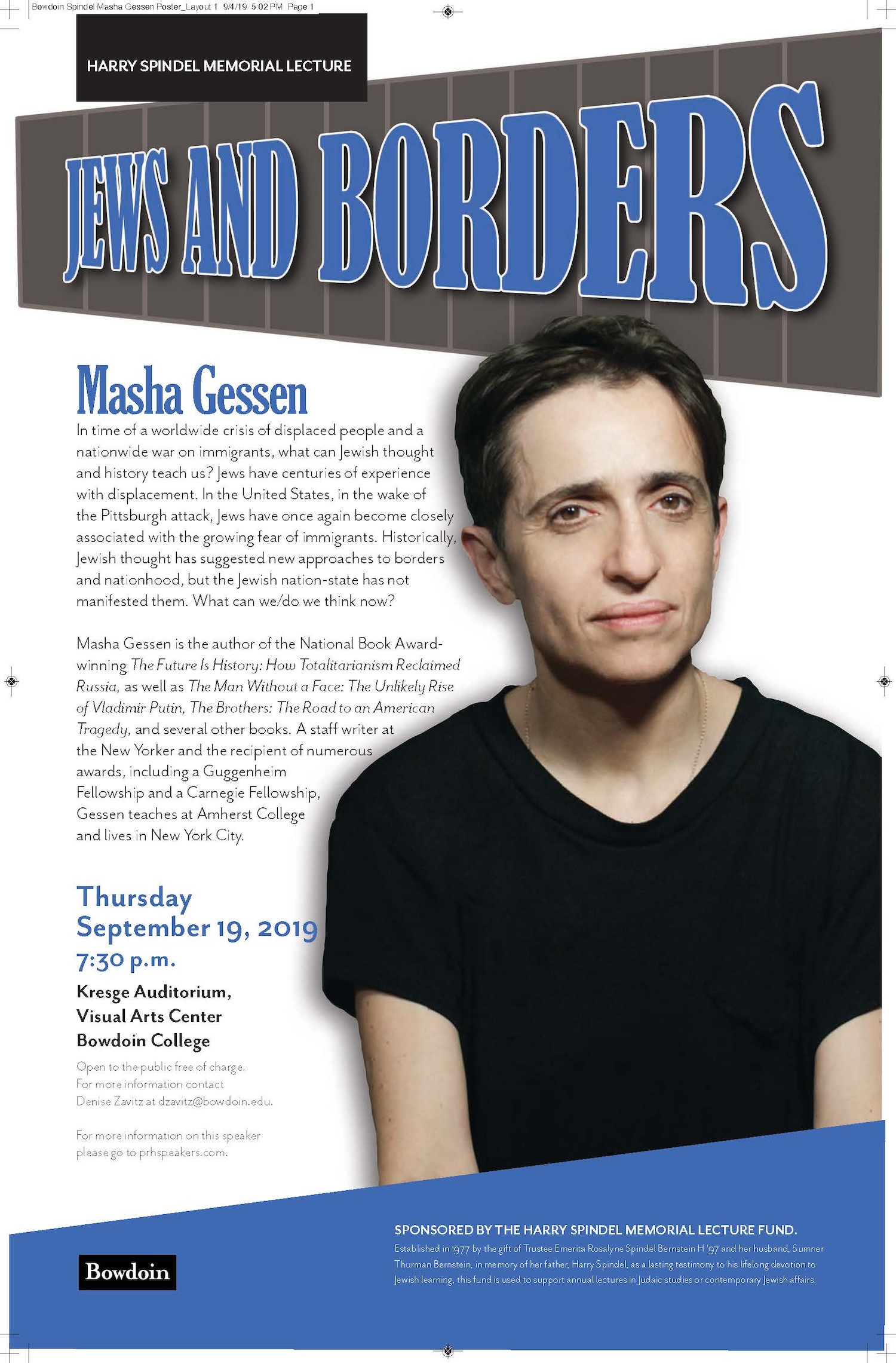
Masha Gessen, author, teacher, and cultural critic
Award-winning author, teacher, and cultural critic Masha Gessen asks: In time of a worldwide crisis of displaced people and a nationwide war on immigrants, what can Jewish thought and history teach us? Gessen is the author of the National Book Award-winning The Future Is History: How Totalitarianism Reclaimed Russia as well as The Man Without a Face: The Unlikely Rise of Vladimir Putin, The Brothers: The Road to an American Tragedy and several other books. A staff writer at the New Yorker and the recipient of numerous awards, including a Guggenheim Fellowship and a Carnegie Fellowship, Gessen teaches at Amherst College, and lives in New York City.
Wednesday, November 7, 2018
Crypto-Jews: To Be and Not to Be
Professor Ilan Stavans, Professor of the Humanities, Latin American and Latino Culture at Amherst College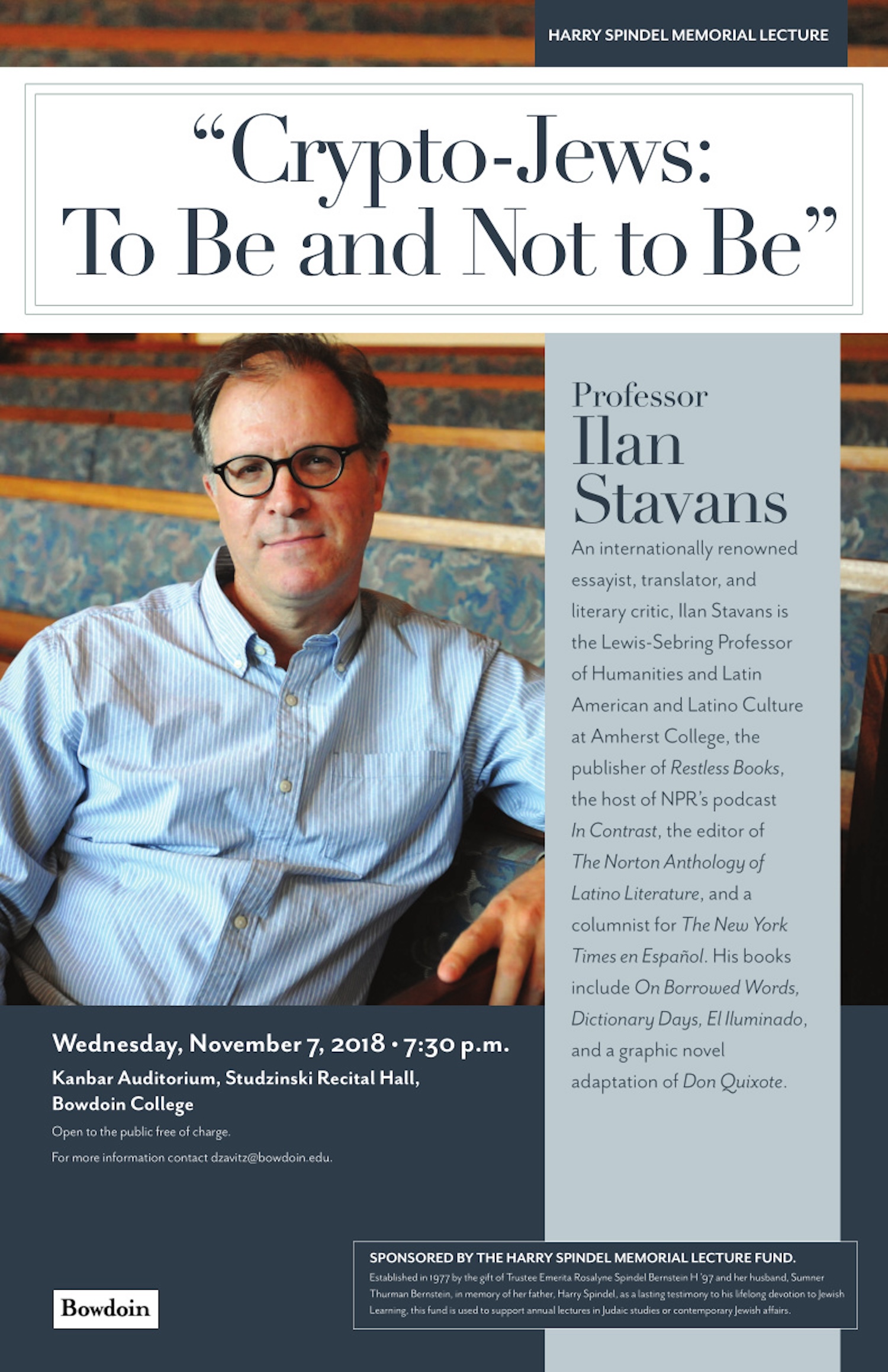
“Crypto-Jews: To Be and Not to Be”: If the Jews, a steadfast people united by a single, never-ending book, are praised for surviving across centuries through a variety of assimilation strategies, crypto-Jews are a unique “people-within-a-people.” From before the fateful 1492 to the present, their presence in Hispanic civilization is at once ubiquitous and discreet, their contribution to science, finances, philosophy, and the arts unquestionable. How does their “revealed secret” work?
Ilan Stavans is the Lewis-Sebring Professor of the Humanities, Latin American and Latino Culture at Amherst College, the publisher of Restless Books, the host of NPR’s podcast In Contrast, and a columnist for the New York Times en Español. An internationally-renowned essayist, translator, and literary critic who is the recipient of numerous awards and honors, Stavans’ books include On Borrowed Words, Dictionary Days, El Iluminado. He adapted Don Quixote into a graphic novel and is also the editor of The Schocken Book of Modern Sephardic Literature, The FSG Book of Twentieth-Century Latin American Poetry, and The Norton Anthology of Latino Literature.
Thursday, October 19, 2017
Did God Abandon the Ghetto?
Peter Fritzsche, Professor of History at the University of Illinois
Professor Fritzsche's talk will examine how beleaguered Jews in German-occupied Poland answered the pressing question "Where was God?" as the Nazis' murderous intentions became increasingly clear. A great deal is known about how the Christian churches responded (or didn't) to the persecution of the Jews, but much less about individual believers and the test of their beliefs in the frightful years 1941 to 1945. Professor Fritzsche has written extensively on cultural history; his books include Reading Berlin 1900 (1996) and Stranded in the Present: Modern Time and the Melancholy of History (2004). He has also continued to explore German and Holocaust history in Life and Death in the Third Reich (2008) and An Iron Wind: Europe under Hitler (2016) which was recently short listed for Phi Beta Kappa's 2017 Ralph Waldo Emerson Prize for contributions to the intellectual and cultural condition of humanity.
Tuesday, November 15, 2016
Issues of Identity
Adi Nes, artist
Israeli artist Adi Nes will discuss his personal artistic language, accompanied by images of his work. He will touch upon issues related to hidden layers in his photographs, the use of canonical icons and social ideas ascribed to them, staged photography which creates reality as opposed to photography which usually reflects reality, and the various faces of Israeli identity. Nes is one of Israel's most prominent photographers. Since his graduation from the Bezalel Academy of Art and Design, Jerusalem (1992), his works have been presented in numerous solo and group exhibitions in Israel and abroad, achieving great recognition and success. Nes' body of work includes five main series to date: Soldiers (1994-2000), Boys (2000), Prisoners (2003), Biblical Stories (2004-2007) and The Village (2012). His creations have won various prestigious awards, including the Anglo-Israeli Photographic Award (1993), the Education, Culture & Sport Minister's Prize for Artists in the Visual Arts (1999), the Gottesdiener Foundation Israeli Art Prize, Tel Aviv Museum of Art (2000), and the Constantine Prize for Photography (2003).
Wednesday, December 2, 2015
Dealing with the Devil: Mussolini, the Vatican, and Italy's Anti-Semitic Racial Laws
David Kertzer, Paul Dupee University Professor of Social Science and Professor of Anthropology and Italian Studies at Brown University
Professor David Kertzer is an internationally renowned scholar and authority on politics and culture, European social history, anthropological demography, 19th-century Italian social history, contemporary Italian society and politics, and the history of Vatican relations with the Jews and the Italian state. He is also an expert on the Vatican's role in World War II and modern anti-Semitism. Kertzer is the author of numerous books and articles focusing on these topics. The Kidnapping of Edgardo Mortara was a finalist for the National Book Award in Nonfiction in 1997, and The Popes Against the Jews, published in 2001, was described as "one of the most critically acclaimed and contentious books of its genre and generation." He received the Pulitzer Prize for his recent work, The Pope and Mussolini: The Secret History of Pius XI and the Rise of Fascism in Europe. From 1973 to 1992, Kertzer was a member of Bowdoin's Department of Sociology and Anthropology.
Tuesday, March 24, 2015
How the Jews Invented Hollywood and Why
Neal Gabler, author
Neil Gabler is a distinguished author, cultural historian, and television commentator who contributes regularly to the New York Times, the Boston Globe, and the Los Angeles Times. An Empire of Their Own: How the Jews Invented Hollywood won the Los Angeles Times Book Prize for history, and the Theatre Library Association Award for the best book on television, radio, or film. In An Empire of Their Own, author Neal Gabler examines the psychological motivations of these film moguls, arguing that their background as Jewish immigrants from Eastern Europe shaped their careers and influenced the movies they made. He explores how these producers (the 'Hollywood Jews') generally came from poor, fatherless backgrounds, and felt like outsiders in America because of their Jewishness. In Hollywood they were able to run their own industry, assimilate into the American mainstream, and produce movies that fulfilled their vision of the American dream.
April 1, 2014
Recovering Nazi Art Loot — Unfinished Business
David D’Arcy
David D'Arcy is a film producer, journalist and critic who is a correspondent for The Art Newspaper of London. D'Arcy, a frequent commentator on the BBC, has been writing about cultural property disputes for more than 25 years for many publications, including The Economist, Vanity Fair, Art + Auction, and Art & Antiques. He is the co-producer and co-writer of "Portrait of Wally," a documentary film about a Nazi-looted painting that turned up on loan at the Museum of Modern Art.
April 11, 2013
Becoming a Jewish Writer
Allegra Goodman, author
Allegra Goodman is the author of Intuition, Paradise Park, Kaaterskill Falls, The Family Markowitz, and Total Immersion. The Other Side of the Island is her first book for younger readers . Her fiction has appeared in The New Yorker, Commentary, and Ploughshares, Prize Stories: the O. Henry Awards and Best American Short Stories. Her essays and reviews have appeared in The New York Times Book Review, The New Republic, The Boston Globe, and The American Scholar.
Raised in Honolulu, Goodman studied English and philosophy at Harvard and received a PhD in English literature from Stanford. She is the recipient of a Whiting Writer's Award, the Salon Award for Fiction, and a fellowship from the Radcliffe Institute for Advanced study.
April 17, 2012
The Poetry of Kabbalah, The Kabbalah of Poetry: Ruminations and a Reading
Peter Cole, visiting fellow at Yale University, Judaic Studies Program
Peter Cole is a poet and translator of poetry and prose from Hebrew and Arabic whose work has received much recognition, including a MacArthur Fellowship. His familiarity with the contemporary Middle East and intimacy with medieval Hebrew come together in his recent book (co-authored with Adina Hoffman): Sacred Trash: The Lost and Found World of the Cairo Geniza.
March 29, 2011
That Obnoxious Order: Ulysses S. Grant and the Jews
Jonathan D. Sarna, Joseph H. and Belle R. Braun Professor of American Jewish History, Brandeis University, and chief historian, the new National Museum of American Jewish History
On December 17, 1862, as the Civil War entered its second winter, General Ulysses S. Grant issued a sweeping order, General Orders #11, expelling “Jews as a class” from his war zone. It remains the most notorious anti-Jewish official order in American history. The order came back to haunt Grant in 1868 when he ran for president. Never before had Jews been so widely noticed in a presidential contest, and never before had they been confronted so publicly with the question of how to balance their “American” and “Jewish” interests. During his two terms in the White House, the memory of the “obnoxious order” shaped Grant’s relationship with the American Jewish community. Surprisingly, he did more for Jews than any other president to his time. How this happened, and why, sheds new light on one of our most enigmatic presidents, on the Jews of his day, and on America itself.
March 9, 2010
Jews as Global Citizens: Our Responsibility in the World
Ruth W. Messinger, president of American Jewish World Service (AJWS)
AJWS is a faith-based international human rights organization that works to alleviate poverty, hunger and disease in the developing world. In addition to its grantmaking to over 400 grassroots projects around the world, AJWS works within the American Jewish community to promote global citizenship and social justice through activism, volunteer service and education. Ms. Messinger assumed this role in 1998 following a 20-year career in public service in New York City, where she served for 12 years on the New York City Council and 8 as Manhattan borough president. She was the first woman to secure the Democratic Party’s nomination for mayor in 1997. Ms. Messinger is continuing her lifelong pursuit of social justice at AJWS, helping people around the world improve the quality of their lives and their communities. Considered a national leader in the movement to end the genocide in Sudan, Ms. Messinger was among leading anti-genocide, peace and human rights advocates called upon to advise President Obama and the new special envoy for Sudan, General J. Scott Gration, in March 2009. In recognition of her leadership, she was recently appointed to the Obama administration’s newly formed Task Force on Global Poverty and Development. She is also involved in organizing faith-based efforts to secure human rights around the world.
|
March 31, 2009 |
||
|
2008 |
Robert Bernheim '86 |
Putting History to Work: One Holocaust Historian's Long Winter from Moscow to Maine. |
|
2006-2007 |
James Carroll |
No War is Holy: Constantine, Crusades, and the Present Crisi |
|
2005-2006 |
Art Spiegelman |
Maus |
|
2004-2005 |
Daniel Boyarin |
Why is Rabbi Yohanan a Woman: Platonic Love and the Talmud |
|
2003-2004 |
Rabbi Michael Lerner |
God and Global Judaism: Strategies for Spiritual Transformation and Social Healing in the Age of Bush and Ariel Sharon |
| 25th Anniversary Series 2002-03 | ||
|
2002-2003 |
Sandi Simcha DuBowski |
Trembling Before God |
|
2002-2003 |
Almuth Herbst and Marien van Nieukerken |
Vocal Music on Jewish Themes |
|
2002-2003 |
Arthur Giglio, Sean Fleming and Anthony Antolini |
Ernest Bloch's Sacred Service |
|
2002-2003 |
Susannah Heschel |
We're Not Jews: Multiculturalism and the New Jewish Studies |
|
2002-2003 |
The Writing on the Wall |
|
|
2002-2003 |
James Young |
After-image of the Holocaust in Contemporary Art |
|
2002-2003 |
Tony Kushner |
Evening Conversation with Tony Kushner |
|
2001-2002 |
Samuel J. Freedman |
Jew vs. Jew: the Struggle for the Soul of American Jewry |
|
2000-2001 |
David Horovitz |
Ariel Sharon's Israel: Heading for War or Peace? |
|
1999-2000 |
Ian Lustick |
Israel and the Iron War: The Role of War in the Peace Process |
|
1998-1999 |
Hasidism: The Life of Piety at Modernity's Door |
|
|
1997-1998 |
100 Years of Zionism: Statesmanship Without a State |
|
|
1996-1997 |
Cheryl Greenberg |
Negotiating Many Americas: Jews, African Americans and Diverse Identities: Blacks and Jews in the Age of Identity Politics |
|
1995-1996 |
Michael Walzer |
The Politics of Biblical Wisdom |
|
1994-1995 |
Sharon Pucker Rivo |
Yiddish Cinema: Between Two Worlds |
|
1993-1994 |
Dori Laub |
Testimony and Truth |
|
1992-1993 |
Barney Frank |
The Politics of Jewish/African-American Relations |
|
1991-1992 |
Roberta Apfel Bennett Simon |
Gas Chambers to Gas Masks: Trauma and Resiliency in Children of War |
|
1990-1991 |
Jewish-Christian Feminists in Dialogue |
|
|
1989-1990 |
Between Washington and Jerusalem |
|
|
1988-1989 |
Grace Paley |
Who's in Charge of Jewish? |
|
1987-1988 |
Elizabeth Holtzman |
U.S. Government and Nazi War Criminals |
|
1986-1987 |
Symposium: Judaism and Otherness:Symposium: Judaism and Otherness: |
|
|
Livia Bitton-Jackson |
The Jewish Literary Stereotype as Metaphor for Cultural Otherness |
|
|
Peter Gay |
In Germany at Home: German Jews In The Weimar Republic |
|
|
Vivian Gornick |
The Feminization of Otherness |
|
|
Geoffrey Hartman |
The Sweat of The Hayyot: Some Images of Otherness In Jewish Thought |
|
|
1985-1986 |
Robert Skloot |
Images of Survival: The Theater of Holocaust |
|
1984-1985 |
Arthur Hertzberg |
Spinoza: The Fount of Jewish Modernity |
|
1983-1984 |
John Hollander |
Autobiography and the Jewish Poet |
|
1982-1983 |
Elaine Brody |
The Jewish Connection in Nineteenth Century Music |
|
1981-1982 |
Nathan Glazer |
American Jews, the United States, and Israel: The Delicate Triangle |
|
1980-1981 |
Jacob Neusner |
Story as History in Ancient Judaism |
|
1979-1980 |
Irving Greenberg |
Ethical Implications of the Holocaust |
|
1978-1979 |
East European Jew and American Culture |
|
|
1977-1978 |
Lucy Dawidowicz |
Historiography of Holocaust |